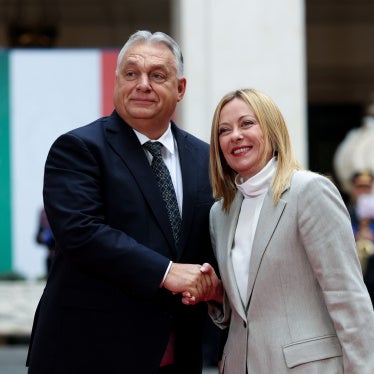(Brussels) - The European Union's decision today to lift the arms embargo against Uzbekistan despite its atrocious human rights record is an unconscionable abdication of responsibility toward Uzbek victims of abuse, Human Rights Watch, International Crisis Group, and Reporters Without Borders said today. The decision underscores the EU's lack of resolve in the face of Uzbekistan's intransigence and severely undermines its global standing and credibility as a principled promoter of human rights, the groups said.
"With today's decision the EU has effectively abandoned the cause of human rights in Uzbekistan," said Holly Cartner, Europe and Central Asia director at Human Rights Watch. "The EU keeps reiterating its demands for human rights but then never actually holds Uzbekistan to those standards, making these demands ring hollow."
EU ministers announced the decision to lift the embargo on arms sales during the monthly General Affairs and External Relations Council (GAERC), held in Luxembourg on October 26 and 27. The embargo was the last remaining portion of the EU's sanctions against Uzbekistan, imposed in response to the government massacre of hundreds of demonstrators, most of them unarmed, in the city of Andijan in May 2005 and the fierce crackdown on civil society that ensued.
Citing what it termed "positive steps" taken by the Uzbek government, including its participation in structured human rights talks with the EU, ratification of international conventions prohibiting child labor, and release of some human rights defenders, the ministers justified the move as a means to "encourage the Uzbek authorities to take further substantive steps to improve the rule of law and the human rights situation on the ground."
Human Rights Watch, International Crisis Group, and Reporters Without Borders said that apart from the dialogues, however, none of the steps characterized by EU ministers as "positive" had taken place during the year under review, which was marked by further deterioration in human rights:
- New attacks on and arrests of activists, including two new arrests just since the beginning of September, and the sentencing of the human rights defender and independent journalist Dilmurod Saidov to 12 and 1/2 years in prison;
- Credible new reports of torture and ill-treatment of detainees, including at least one suspicious death in custody;
- A compulsory relicensing of lawyers, which the Uzbek government appears to be using to revoke the licenses of those who defend individuals persecuted on political grounds; and
- Interference in the work of human rights organizations, including the ban on entry into the country and deportation of a Human Rights Watch research consultant in July, taking the government's obstruction of the organization's work to a new level.
"The EU's praise of ‘positive steps' under these circumstances is frankly absurd and utterly discredited by developments on the ground," said Cartner. "The EU is rewarding Tashkent with a stamp of approval at a time when it could not have deserved it less."
Human Rights Watch, International Crisis Group, and Reporters Without Borders urged the EU to truly focus its Uzbekistan policy on securing the human rights improvements it has repeatedly called for, including in particular the release of all imprisoned human rights defenders, unhindered operation of civil society groups, and full cooperation with, including access to the country for, UN special rapporteurs.
The EU's top concern should be the plight of at least 12 human rights defenders whom the Uzbek government continues to hold in prison for no reason other than their legitimate human rights work. They are: Solijon Abdurakhmanov, Azam Formonov, Nosim Isakov, Alisher Karamatov, Jamshid Karimov, Norboi Kholjigitov, Farkhad Mukhtarov, Habibulla Okpulatov, Abdurasul Khudainasarov, Yuldash Rasulov, Dilmurod Saidov, and Akzam Turgunov.
Many other civic activists, independent journalists, and political dissidents have also been imprisoned on politically motivated charges, including the poet Yusuf Jumaev and the opposition leader Sanjar Umarov.
"The only hope these people have is sustained international pressure to secure their freedom," said Cartner. "They should be able to count on the EU's resolve."
In addition to failing Uzbekistan's human rights victims, Human Rights Watch, International Crisis Group, and Reporters Without Borders said the EU decision to drop the remaining sanctions despite Tashkent's failure to meet the criteria it has set for lifting them would severely damage the credibility of its human rights policy worldwide.
"The message this decision sends to repressive leaders around the world is clear: ‘Defying our reform demands carries no consequences because we will ultimately back down,'" said Cartner. "This is a message the EU simply cannot afford to send."
Background
The European Union imposed sanctions on Uzbekistan in October 2005, in response to Tashkent's refusal to agree to an international commission of inquiry into the government massacre in Andijan and the fierce crackdown on civil society that ensued.
The sanctions originally consisted of a visa ban on 12 Uzbek officials the EU considered "directly responsible for the indiscriminate and disproportionate use of force in Andijan," an arms embargo, and partial suspension of the Partnership and Cooperation Agreement (PCA), the framework that regulates the EU's relationship with Uzbekistan. This was the first time the EU had suspended a PCA with another country over human rights concerns.
In the four years since it imposed the sanctions, the EU has incrementally weakened them despite the Uzbek government's persistent defiance of the EU's human rights demands.
The EU lifted the partial suspension of the partnership agreement in November 2006, and then took the names of four officials off the visa ban list in May 2007. In October 2007, while extending the sanctions for another 12 months, it suspended the visa ban for six months, justifying the move as a constructive gesture aimed at encouraging the Uzbek government to undertake the necessary human rights reforms. In April 2008 it extended the suspension of the visa ban for another six months, only to drop the ban altogether in October 2008, leaving in place only the arms embargo.







